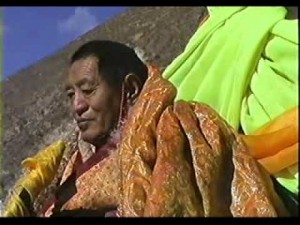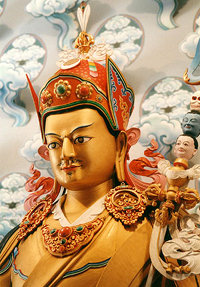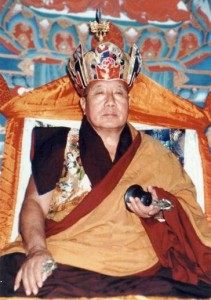The following is an excerpt from a public talk given by His Holiness Khenpo Jigme Phuntsok:
The Buddha taught that true happiness and peace can never be found through material gain, and the only way that one can truly be satisfied is to realize this point. Therefore it is very important for all of you to consider decreasing your attachment to the objects of this world, to all apparent phenomena, and to understand that more important than spending most of one’s time pursuing the material world and thinking that happiness can be found in this way, we should try to practice pure Dharma. Not only that. To be too attached to friends, family members, even our children and our spouses, those whom we cherish, thinking that it is only through our relationships with them that we can have happiness, is only going to bring us more suffering. This is also a source of suffering, since we will be distracted having to figure out how we can bring food to the table and get clothing for our offspring and all of the other necessities that one has to completely fill one’s mind with. The details of survival for family and friends will completely distract one from the benefits of purely practicing Dharma.
Regarding the wish for fame and glory: Those who don’t have it suffer because they don’t. Those who are poor and those who have no position at all are always having some expectation that somehow and in some way they may be able to rise above this circumstance and achieve a position of fame and glory. Those who are already in positions of fame, glory and leadership are always suffering from the fear that they are going to lose their positions. So in both cases the suffering is more or less equal. On this point I would like to say that probably here in this place there are those who are very, very poor and there are those who are very, very wealthy and in high positions, and there is quite a big space between them. I was thinking that those who are in the high positions are probably suffering even more than those who are poor. The reason for that is because those who are poor—except for the fact that they are always having some kind of an expectation that someday they may become wealthy or in a better position—probably have enough to survive, are getting along sort of all right. And the mental suffering that they endure is not too extreme, except for that expectation or wish. But those who are in high positions are probably suffering much more because they are always fearful that they are going to lose their positions, that they will fall down to a lower place. So their minds are filled with doubt and paranoia and anxiety. In this way they suffer more than the poor people.
The nature of suffering is twofold: Suffering is caused by delusion and by karmic propensities. When we speak of delusion, it refers to three root conflicting emotions: desire-attachment, anger or aggression, and delusion itself, stupidity. Let’s look at desire-attachment first. Now this conflicting emotion fixates itself upon objects, objective appearances, such as material things, fame, status or other human beings or individuals. Wherever it fixates, then if one allows oneself to become controlled by that emotion, then the only result will be unceasing suffering or discontent.
Anger or aggression is a conflicting emotion which causes one to feel that one actually wishes that others will suffer. That which brings up this conflicting emotion of aggression is due to the desire-attachment that we have for ourself and those that we are already attached to because if anyone else tries to harm them, then those other people who are trying to harm our loved ones or friends are termed enemies, and we feel aggression towards them and wish that harm would come to them. As soon as we enter into this type of emotional battle, the only result is unceasing suffering.
That which is termed delusion or stupidity is the inability to understand or recognize what should be accepted, what should be rejected, what should be accomplished and what should be abandoned. Inner divisions of delusion include misunderstanding and incorrect understanding. The first of these inner divisions of delusion, misunderstanding, could also be interpreted as misunderstanding, or misusing, the ultimate purpose of this life. The way that that would qualify is that one would have to be born as a human being anywhere in this world who never really understands the difference between that which is wholesome and that which is unwholesome, never having any real kind of ability to discern what should be accepted in order to produce true, positive results and what should be rejected—basically just spending one’s life aimlessly living like a cow or a horse which can graze and eat grass and just kind of survive. The difference between a cow or a horse and a person who is just kind of aimlessly surviving is maybe the person is able to put on clothes and other kinds of comfort. But really the point that is being made is that this person who misunderstands the purpose of life is wasting his or her opportunity because they dwell in this state of delusion, the delusion of misunderstanding what should be done with life.





